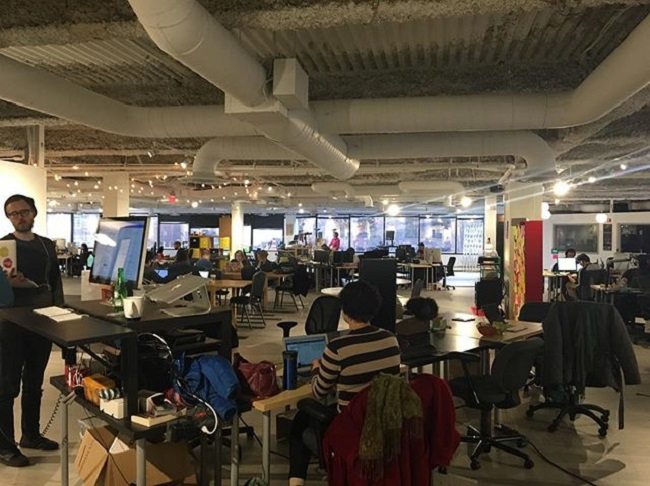Old City’s Indy Hall — Philly’s pioneering coworking community, established in 2006 — finished 2017, a year of reckoning for many industries, with its first Code of Conduct in place.
There was no triggering event, no scandal or shameful incident, that set off the creation of the 730-word document, says cofounder Alex Hillman. It started as a way of building a collective “sense of ownership” at the 300-member coworking spot.
“I started to understand a code of conduct as a tool for specifically and clearly communicating something that I had intended all along but wasn’t saying out loud: ‘This institution belongs to all of our members, and together, we’re prepared to help protect that,'” Hillman wrote in a blog post.
Sam Abrams, community cultivator at Indy Hall, led initial research efforts to find actionable tools that encourage a sense of belonging. Having an explicit Code of Conduct arose as a trend, so with the help and expertise of members, a draft was presented to the community in December.
“While it’s easy to assume that your clients, customers, and coworkers know your business has their back if anything happens, a Code of Conduct explicitly lays out how you have their backs,” said Abrams, who conceived and wrote the guidelines. “It states clearly how all parties expect to treat each other and be treated, and what will happen if something crosses a line. While for many of our members it will not change how they go about their daily lives as Indy Hall members, many more have already expressed how much more supported they feel knowing that document is there.”
Abrams also suggested a starting point for those looking to establish a similar set of rules: Geek Feminism Wiki’s list of anti-harassment policy resources.
“Having a Code of Conduct does not supersede or ‘undo’ any of our existing core values or expressions of who we are,” Hillman wrote. “Instead, this should add additional depth and dimension to our core values by making existing expectations more clear, and reducing opportunities for confusion & hurt.”
Read through the code of conduct and you’ll find general mission statements (“Treat others with the professionalism, warmth, and respect with which you would like to be treated”) along with specific definitions of what constitutes misconduct and ways to report it directly or anonymously.
For longtime member Lansie Sylvia, an engagement expert and organizer of the Indy Hall Girl Scout Troop, the guidelines open the door for others to feel safe at 399 Market St., as she has felt through the years.
“I’ve had years of demonstrated acceptance and inclusion of the person that I am,” Sylvia said. “I think this makes it clearer to a new person coming in what we stand for. This explicitly puts out that anyone can own this community.”
Items in the code of conduct actually echo rules within the “Brownies.” As part of the group’s “Troop Principles,” the kiddos made it clear unwanted name-calling is not O.K.
“It’s awesome and weird to see 38-year-olds and 8-year-olds have similar thoughts,” Sylvia said.
https://twitter.com/alexhillman/status/948727012730032128
Instructional designer Vanessa Gennarelli, also a member of the coworking spot, said she was pleased about the code of conduct being place, and praised Sam Abrams for leading the effort.
“There are skeptics out there who think a piece of paper or a Word doc will do little to change the behavior of bad actors,” Gennarelli said in an email. “But as a social scientist, I know that we can prime behavior to bring out the best in people. Plus, our community norms should be written down and accessible so that our expectations are clear. Community members should be aware of what’s inbounds and what’s not—that’s good stewardship.”







